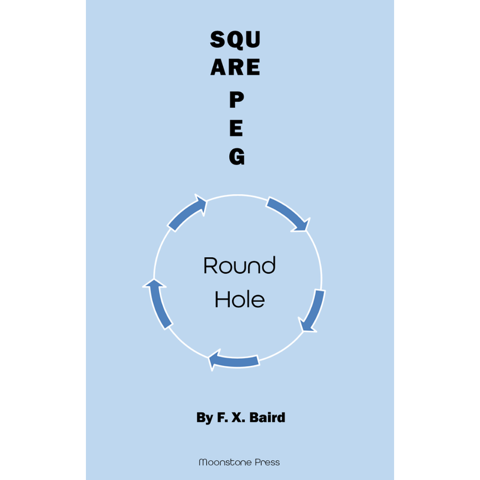F.X. Baird is a keen observer and commentator, as demonstrated by his recent chapbook, Square Peg Round Hole. A thoughtful and engaged writer, he offers perspectives on life, religion, and where to find optimism in what can be a difficult and alienating existence.
The book consists mostly of open verse poetry, with occasional short prose pieces mixed in.
In “Triptych of the Incarnation,” the poem that opens the 32-page collection, the narrator reflects on his birth and each of his parents, concluding:
Ahead, my life, the crucifixion
of addiction, its recovery,
the irritation of not knowing
why I am here, who is my God.
One gets the sense that he is questioning a life that is challenging and searching for meaning in that life. This perception is reinforced throughout the collection. “I’ve given up on anyone interpreting this life for me,” Baird says in “Off Balance in Three Acts.”
The themes of God and religion also recur throughout the book. In “Mystery,” the narrator seems to ask whether God exists, inquiring, “Are you there/ waiting in silence that is deafening?”
Baird explores questions about the afterlife in poems such as “My Father’s Ghost”:
Beyond the door of death,
I hear no raucous party, tear-smeared reunion,
see only the vast re-cycling of souls where thirst
evaporates in our mouths.
His words suggest he does not subscribe to Judeo-Christian beliefs concerning life after death. Further evidence of Baird’s perspective on religion and the relationship of Man to God surfaces in “And God Said”:
And we bow and pray
as if a bended knee will sway
the answer to our prayers.
In “Dark Matters,” Baird reflects, “I’ve been waiting for God to show up all my life.”
Religion is not the only system Baird interrogates and finds lacking. In “American Haiku,” he critiques the attitudes typical in the United States, which he calls the “little country with the big heart and bigger ego.”
The title of Baird’s book is significant. The narrator of his poems often does appear to be a “square peg in a round hole”—someone who feels inherently alienated, inherently isolated. In “My Father’s Ghost,” he says he has “no illusions that I am anything more/ than alone.” At the conclusion of “American Twilight,” he queries, “You know holidays at home, the card table at the end/ of the big table? I’m always there, alone, at the end.”
In the context of not buying into or fitting with the belief systems around him, Baird appears to find the world daunting. “She knew the truth,” he says of Eve in “And God Said.” “We are born in pain.” In “Hyena,” he says, “I gnaw on the life left to me.”
Some might describe Baird’s perspective as cynical. However, we glimpse in this collection an inherently hopeful outlook as well. Such is the case in “No. 40,” a prose piece in which Baird relates the story of a slave who ships himself to freedom in Philadelphia in 1849. The piece ends with the optimistic lines, “What song are we to sing? For we have been delivered into this day to change all that we see, all that we feel and think, about each other and ourselves.”
The poem “I Saw a Little Girl Running with a Jump Rope” also demonstrates the writer’s ability to find the positive in the common things of the world. Baird’s powers of observation are on full display as he describes coming upon a family that has parked their van behind a school. It’s the youngest member of the group, a girl of about 3, who captures Baird’s attention.
She emerged from the van with a jump rope, a simple
object, began to run, trailing the rope behind, twisting her
neck around to see the plastic grip bounce up and down as she
ran, a smile splitting her face.
Baird describes the girl as “taking a simple thing, ignoring its purpose/ its design, transforming it into something not yet imagined, creating joy.”
But it’s the book’s final poem—my favorite of the collection—that offers the most optimism. “Redemption” describes the narrator’s outing with his young daughter:
She inventories the yard into the bright afternoon,
through squeal and discovery shreds the veil that time
has laid over my ears, my eyes.
He describes how “She turns to me, eyes shining, gripping the earth with her toes/ Do you see this, do you feel this? I do, daughter, I do.”
The poem suggests that in an uncertain life, even for one who finds emptiness and failure in traditional belief systems, innocence, wonder, and beauty are still possible.
Abbey J. Porter writes poetry and memoir about people, relationships, and life struggles. She holds an MFA in creative writing from Queens University of Charlotte, an MA in liberal studies from Villanova University, and a BA in English from Gettysburg College. Abbey works in communications and lives in Cheltenham, Pa., with her two dogs.


